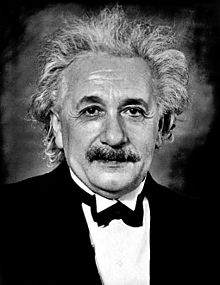|
A very brief summary. Search for more on Albert Einstein
 Albert Einstein was a German-born theoretical physicist. He developed the general theory of relativity, one of the two pillars of modern physics. Einstein's work is also known for its influence on the philosophy of science.
Albert Einstein was a German-born theoretical physicist. He developed the general theory of relativity, one of the two pillars of modern physics. Einstein's work is also known for its influence on the philosophy of science.
Wikipedia
In 1895, at the age of 16, Einstein sat for the entrance examinations for the Swiss Federal Polytechnic in Zurich (later the Eidgenossische Technische Hochschule, ETH). He failed to reach the required standard in the general part of the examination, but obtained exceptional grades in physics and mathematics.
On the advice of the principal of the Polytechnic, he attended the Argovian cantonal school (gymnasium) in Aarau, Switzerland, in 1895-96 to complete his secondary schooling.
He was married several times. See Marriages and children wikipedia
In 1900, Einstein's paper "Folgerungen aus den Capillaritaetserscheinungen" ("Conclusions from the Capillarity Phenomena") was published in the prestigious Annalen der Physik. On 30 April 1905, Einstein completed his thesis, with Alfred Kleiner, Professor of Experimental Physics, serving as pro-forma advisor. As a result, Einstein was awarded a PhD by the University of Zuerich, with his dissertation entitled, "A New Determination of Molecular Dimensions.
Einstein spent almost two frustrating years searching for a teaching post.
He finally, with the help of a friends father, secured a job in Bern at the Federal Office for Intellectual Property, the patent office.
He became famous at the age of 26 for a series of four papers in 1905, his "annus mirabilis" (miracle year).
- Photons - He proposed the existence of the photon, an elementary particle associated with electromagnetic radiation (light), which was the foundation of quantum theory.
- A theory of Brownian motion in terms of fluctuations in the number of molecular collisions with an object, providing further evidence that matter was composed of atoms.
- The theory of special relativity, which reconciled the relativity of motion with the observed constancy of the speed of light (a paradox of 19th-century physics)
- Mass-energy equivalence - Its relation E=mc2 suggested that matter was a form of energy, which was later verified by the mass defect in atomic nuclei.
Between 1907 and 1915, Einstein developed the theory of general relativity (GR), a classical field theory of gravitation that provides the cornerstone for modern astrophysics and cosmology.
General relativity was the first, and remains the only, theory capable of uniting space, time, mass, energy, motion, and light in a grand vision of the nature and the fate of the cosmos.
By 1912, Einstein was actively seeking a theory in which gravitation was explained as a geometric phenomenon.
He began by exploring the use of general covariance (which is essentially the use of curvature tensors) to create a gravitational theory.
Tensors are geometric objects that describe linear relations between geometric vectors, scalars, and other tensors.
When Einstein realized that general covariance was actually tenable, he quickly completed the development of the field equations that are named after him. However, he made a now-famous mistake. The equations lead to inconsistencies.
Einstein went back to work and in 1915 presented the corrected Einstein field equations to the Prussian Academy of Sciences.
In 1917 he turned to a consideration of the spacetime structure of the whole universe. He then encountered a problem. Einstein was assuming that, when suitably averaged over many stars, the universe is uniform and essentially static, but the equations of general relativity did not seem to allow a time-independent solution for a universe with a uniform distribution of matter. So Einstein modified his equations, by including a new term involving a quantity that he called the cosmological constant. Then it was discovered that the universe is not static, but expanding. Einstein came to regret that he had needlessly mutilated his original theory. It may also have bothered him that he had missed pre- dicting the expansion of the universe.
See The Master's Mistakes | DiscoverMagazine.com
GR predicted the deflection of light by massive bodies.
German astronomer Erwin Finlay-Freundlich publicized Einstein's challenge to scientists around the world. This urged astronomers to detect the deflection of light during a solar eclipse.
In 1917 several astronomers tried to prove this and claimed to disprove Einstein's prediction.
However, in May 1919, a team led by the British astronomer Arthur Stanley Eddington claimed to have confirmed Einstein's prediction of gravitational deflection of starlight by the Sun while photographing a solar eclipse with dual expeditions in Sobral, northern Brazil, and Principe, a west African island.
See: History of general relativity - Wikipedia
In 1921 he received the Nobel Prize in Physics for his 1909 work showing that the photon carries momentum as well as energy and that electromagnetic radiation must have both particle-like and wave-like properties if Planck's law holds; this was a forerunner of the principle of wave-particle duality.
In February 1933 while on a visit to the United States, Einstein knew he could not return to Germany with the rise to power of the Nazis under Germany's new chancellor, Adolf Hitler.
He returned to Belgium and immediately went to the German consulate and turned in his passport, formally renouncing his German citizenship.
Einstein's works were among those targeted by Nazi book burnings, with Nazi propaganda minister Joseph Goebbels proclaiming, "Jewish intellectualism is dead."
He went to England and worked to get Jewish scientists out of Germany.
In October 1933 Einstein returned to the U.S. and took up a position at the Institute for Advanced Study (in Princeton, New Jersey)
Links:
Search for more on Albert Einstein
The Master's Mistakes | DiscoverMagazine.com
last updated 16 Feb 2016
|